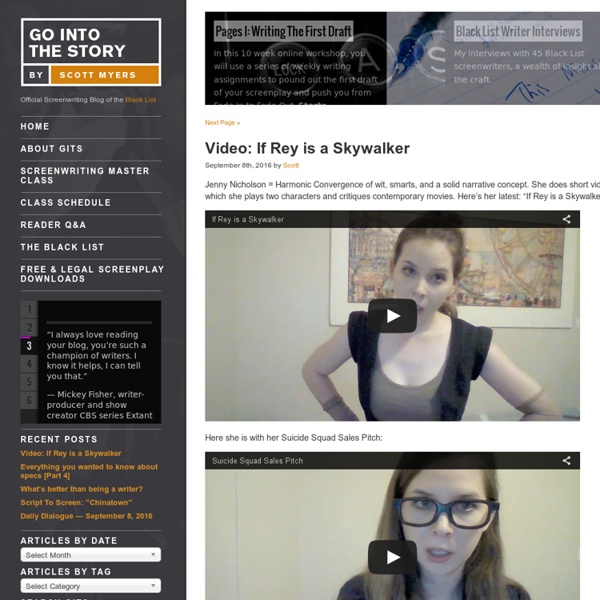



Voleur de secrets Okay, this rat is leaving the ship. I’m not going to delete it, but I’m not going to use this blog anymore for a while. Maybe later. But after I made that post considering leaving it another 10 people started following, and I am too anxious as a person to feel comfortable with having a personal blog/scrapbook followed by this large a crowd. I’ll probably follow a bunch of people I follow here now and should be easy enough to recognise (I think) but I might just message you a hello from my new tumblr if I remember to! Hmm. “ The possibilities of pleasure seemed that morning so enormous and so various that to have only a moth’s part in life, and a day moth’s at that, appeared a hard fate, and his zest in enjoying his meagre opportunities to the full, pathetic. — from The death of the moth - Virginia Woolf
Time to Write PostSecret 36 situations dramatiques Un article de Wikipédia, l'encyclopédie libre. 36 situations dramatiques est le nom d’une théorie proposée par le français Georges Polti (15 décembre 1867 - Juin 1946) dans Les 36 situations dramatiques et selon laquelle il existe, pour tout type de scénario, 36 situations dramatiques de base. Les travaux de Polti sont inspirés de ceux de l’Italien Carlo Gozzi (1720-1806) et de l’Allemand Johann Wolfgang von Goethe (1749-1832). Contenu de l'ouvrage[modifier | modifier le code] Le livre présente trente-six situations dramatiques avec, pour chacune, les rôles ou « éléments dynamiques indispensables » qu'elle implique. Ainsi par exemple, la situation Implorer demande un Persécuteur, un Suppliant et une Puissance indécise. Les Situations ne sont cependant pas des catégories bien tranchées puisque certaines nuances d'une Situation peuvent toucher à une autre Situation. Postérité de la théorie[modifier | modifier le code] Les situations[modifier | modifier le code]
The Future Of Storytelling: Immersion, Integration, Interactivity, Impact As technology becomes more advanced and more accessible across multiple platforms, it’s only natural for consumers to expect increasingly higher standards of creativity and engagement from content creators. However, with social media, apps, tablets, smartphones, websites, TV, etc. all part of the audience’s viewing habit, learning how stories should be evolving and how to make narratives work across platforms is a complicated matter. A new study offers some perspectives on what audiences may be looking for in their stories. Research consultancy Latitude recently released phase one of a two-part study titled "The Future of Storytelling" that looks to uncover trends and audience attitudes about content. Based on participants’ responses the study zeroes in on "four I’s" that will continue to shape storytelling: Immersion: Delving deeper into the story through supplementary context and sensory experiences. Other findings from the study:
Writing A TV Drama Script (TV Drama) Pamela Douglas (Screenwriter) gives expert video advice on: How do I know if my idea will make a great TV drama?; How many pages is a TV drama script?; What do I do if my script is running long? and more... What are the stages when writing a TV drama? Writers, whether they are working speculatively, or on a show, go through known stages. What is a 'spec script'? A spec script is a speculative piece of writing which you have done without a commission and without being paid, in order to demonstrate your skill. What is 'breaking a story'? Breaking a story is finding the turning points in the story by defining the structure of how the tale will spin out. What is an 'outline' for TV drama? An outline is a list of the scenes that exist in the final script and it will probably be that way on screen as well. What is a 'polish'? How many pages is a TV drama script? Drama scripts used to be, and some still are, around 60 pages, even though they don't really film to a full 60 minutes. What is a 'pitch'?
Patrizia Soffiati - Google+ - Cos'è una storia? +You Search Images Maps Play YouTube News Gmail Drive Calendar More Translate Mobile Books Offers Wallet Shopping Blogger Reader Finance Photos Videos Even more Account Options Sign in Join Google+ Share the right things with just the right people. Patrizia Soffiati Lived in Avigliana (To) Italia View full profile Report / block Patrizia Tre W s.c. originally shared this post : Cos'è una storia? Raccontare i fatti o narrare una storia? Cos'è e cosa non è una storia, come riconoscere e applicare le tecniche narrative al marketing e alla comunicazione, in un'ottica di trasparenza e onestà. Add a comment... You can see more of what Patrizia Soffiati shares on her profile . ©2013 Google - Terms - Map data © 2013 : Terms of Use - Content Policy - Privacy - English (United States) / Set region Add to circles
johnaugust.com - A ton of useful information about screenwriting from screenwriter John August Storytelling | Il menestrello 2.0 Era il mio primo giorno da studente fuorisede nella città eterna. L’ora di pranzo si avvicinava, e come tutti i giorni ero pronto a sedermi in tavola per gustare le pietanze della cucina lucana preparate da mamma. C’era un piccolo inconveniente, mancavano sia le pietanze lucane che mia madre! La situazione era aggravata dalla mia totale incapacità di cucinare qualsiasi piatto. Avrei potuto reperire alcune ricette sul web, ma sette anni fa non tutti i siti contemplavano la preparazione di piatti veloci per cuochi alle prime armi, tantomeno i social network. Sono stato costretto a telefonare mia madre, ma se fossi stato una matricola del 2013, la community che sto per descrivere sarebbe senz’altro venuta in mio aiuto. Per descrivere l’iniziativa voglio partire da questa frase:Visto che buono è un sito di social cooking che ti fa scoprire tante buone ricette semplici e veloci e consigli utili per i tuoi piatti. Ti è piaciuto l'articolo? Mi piace: Mi piace Caricamento...